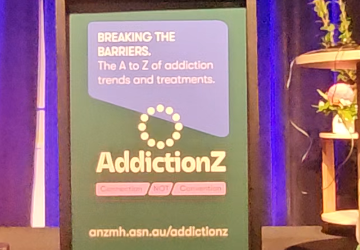At the AddictionZ 2025 Conference on the Gold Coast, Lifewise Chief Executive Haehaetu Barrett delivered a presentation titled ‘Takahia tōu ara o te whakapono – Traverse your pathway with truth and conviction.’ Her address explored the role of self-determination, cultural grounding, and lived experience in shaping services, policies, and workforce development in addressing social issues such as addiction and homelessness across Aotearoa New Zealand.
Haehaetu, who has worked in the mental health and addictions sector for over 30 years, shared her perspective on workforce transformation through a Te Ao Māori lens. Drawing on her experience as both a former social worker and organisational leader, she reflected on the importance of truth and conviction in serving communities facing complex issues, including addiction, mental distress, homelessness, and intergenerational trauma.
Reimagining Services by Thinking Out of the Box
In her address, Haehaetu reflected on Lifewise’s decision in 2009 to close central Auckland’s long-running soup kitchens and instead establish Merge Café — a space co-designed and led by people with lived experience. The café provides food, employment, and access to wraparound support services, and has operated in Auckland’s city centre for over a decade.
She described the shift as a deliberate move towards creating pathways that prioritise long-term recovery and meaningful support, rather than maintaining traditional models of dependency. The initiative exemplifies how Lifewise has implemented community-based alternatives that integrate housing, health, and peer-led services.
“We did something very, very crazy as LifeWise back in 2010. We shut down soup kitchens, central city Auckland and Aotea Square, where a lot of people with addictions were walking in and out of the soup kitchen, in and out, but no change was being made.
Support services wrapped in between so people who used to come in for the soup kitchen experience now started to come in and be supported. If they required housing, they were appropriately placed. If they required support around addictions, they were appropriately triaged. Not come back in the morning, not come back in the evening, and no change. Those are things that we have to do.
We have to do things out of the box.”
Looking Ahead
Haehaetu concluded her presentation with a call for collective action, emphasising that no single organisation can meet the scale or complexity of current challenges alone. She stressed the importance of working across services, sectors, and national borders to develop sustainable, community-led, and culturally grounded responses.
Her contribution to AddictionZ 2025 provided grounded insights into the realities of frontline service delivery, sector leadership, and the importance of lived experience. By linking historical context with contemporary practice, Haehaetu encouraged delegates to reflect on the values that drive their work — and the direction of future service development.
To watch the full presentation, click on the video below:


